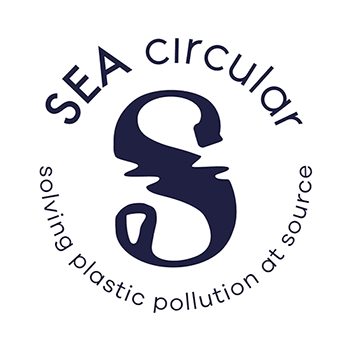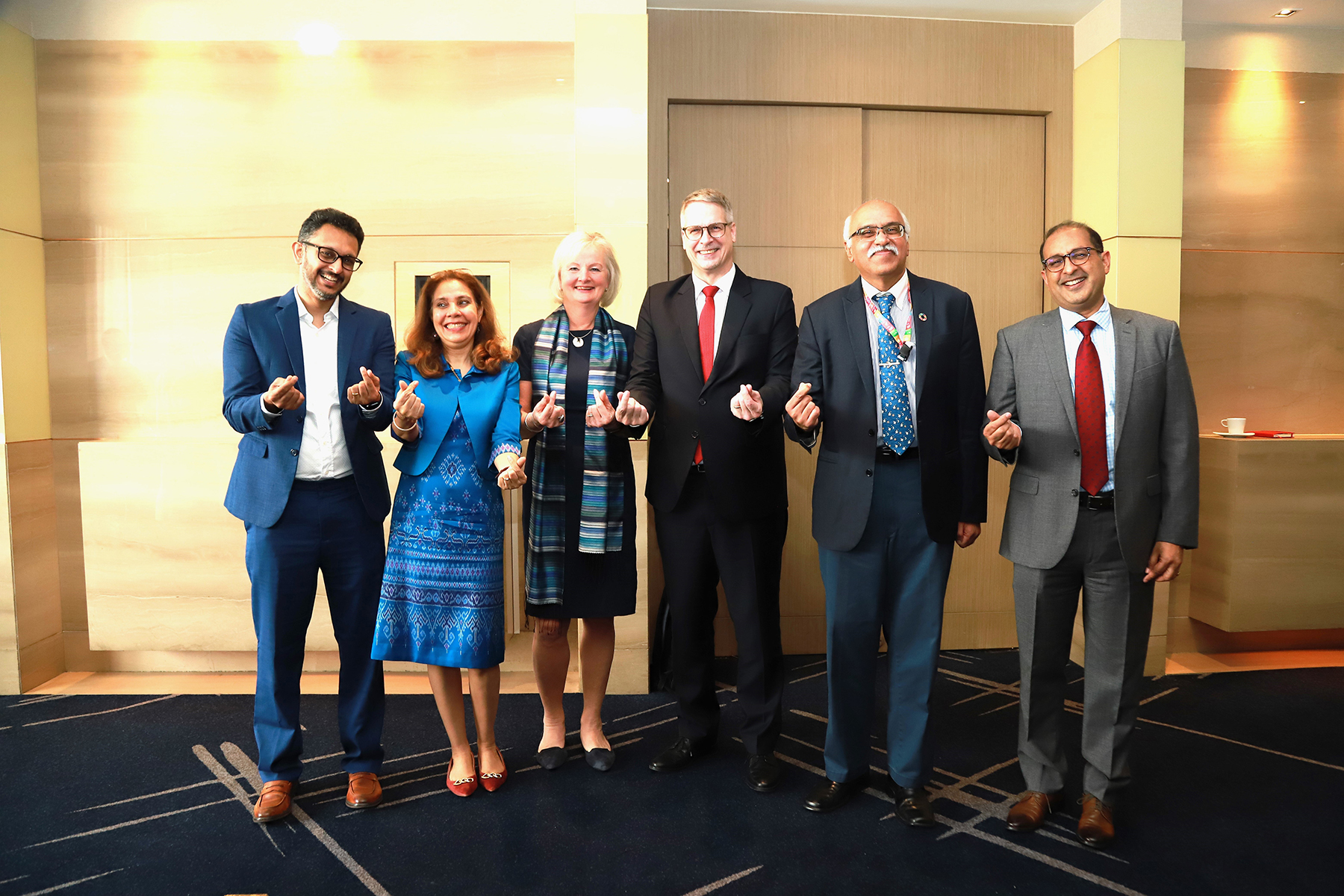
Empowering UN Resident Coordinators: Strategies to Combat Plastic Pollution in the Asia Pacific Region
Bangkok, 28 February 2024
From Left to Right-Mr. Dirk Wagener, UN Resident Coordinator to Fiji, Solomon Islands, Tonga, Tuvalu and Vanuatu, Ms. AnnaMaria Oltorp, Head of Development Cooperation Section–Regional Asia and the Pacific, Embassy of Sweden in Bangkok, Mr. Anouj Mehta, Country Director, Asian Development Bank (ADB), Thailand , Ms. Gita Sabharwal, UN Resident Coordinator to Thailand and Mr. Umesh Madhavan, Research Director, the Circulate Initiative.
Plastic pollution is a global crisis demanding urgent action by all. The recent briefing session organized by the United Nations Environment Programme (UNEP) in collaboration with the Development Coordination Office (DCO) shed light on the concerted efforts underway to address this pressing issue. Held as part of the Asia-Pacific Region Resident Coordinators’ Annual Retreat, the session aimed to equip Resident Coordinators (RCs) from Asia Pacific with insights and tools to spearhead effective UN actions against plastic pollution in the region.
Understanding the Context
The backdrop of the briefing underscored the escalating urgency to combat plastic pollution, with the ongoing global efforts through the Intergovernmental Negotiating Committee (INC) striving to establish an international legally binding instrument by 2024. UNEP’s One Plastics Initiative (OPI) is at the forefront of this battle, consolidating efforts across industry, policy, finance, and capacity building. At the country level, RCs play a pivotal role in guiding UN Country Teams (UNCTs) in formulating policies, developing projects, fostering collaborations, and mobilizing finances to combat plastic pollution effectively.
To build upon the ever-strong momentum to address plastic pollution, UNEP and DCO convened a specialized session involving 24 Resident Coordinators from the Asia Pacific regions. The session aimed to tackle the escalating challenge of plastic pollution, raising awareness of RCs of the current landscape and actionable solutions, while encouraging more impactful UN initiatives in the area.
Active participation in the Q&A session by RC’s
Key Highlights from the Session

Marlene Nilsson, the Acting Regional Director for the UNEP Asia Pacific Office, assumed the role of moderator for the initial session. Subsequently, Dirk Wagener, the Resident Coordinator for Fiji, Solomon Islands, Tonga, Tuvalu, and Vanuatu, moderated the panel discussion that ensued.

The session was divided into two segments, focusing on the concept of bankable projects and the dynamics of resource mobilization. Dr. Mushtaq Memon from UNEP provided an overview, emphasizing the need to leverage global financial assets to bridge the substantial funding gap for achieving Sustainable Development Goals (SDGs). Despite significant investments in downstream solutions, it was highlighted that there is a critical need to shift focus towards upstream interventions.

Brenda Koekkoek from the INC Secretariat delved into the evolving considerations around financial mechanisms and national plans within the INC process, highlighting ongoing discussions and proposed options.
Speakers and panelists included (read bios):
- Gita Sabharwal, UN Resident Coordinator to Thailand
- Anna Maria Oltorp, Head of Development Cooperation Section–Regional Asia and the Pacific, Embassy of Sweden in Bangkok
- Anouj Mehta, Country Director, Asian Development Bank (ADB), Thailand
- Umesh Madhavan, Research Director, the Circulate Initiative
The panel discussion brought together perspectives from RCs, development partners, and private sector analysts. Insights ranged from the UN’s role in country-level programming to the challenges and opportunities in developing bankable projects. It was echoed by panelists that efforts should be made in the following areas to address some of the challenges:
- Capacity building among producers and users of plastic products.
- Raising awareness about the importance of sustainable practices.
- Developing project concepts to attract innovative financing.
- Scaling up funds through public financing mechanisms.
Panelists discussed on bankable plastic projects, co-creation and where this is applied?
The Role of RCs and UNCTs
RCs and UNCTs were identified as crucial facilitators in promoting cross-agency collaboration and leveraging partnerships. Their role in convening relevant stakeholders and fostering deep relationships within UN Resident Coordinator Offices (UNRCOs) was underscored. Additionally, there was a call for proactive engagement in developing the international legally binding instrument on plastics.
UNEP’s Ongoing Support
UNEP’s continuous support towards UNCTs in addressing plastic pollution was acknowledged, particularly its technical assistance and utilization of technology for mapping pollution hotspots. Participants expressed interest in receiving support from the UNEP’s Finance Initiative (UNEP FI) to develop viable project pipelines, highlighting the importance of financial support in tackling environmental challenges effectively.
Asia-Pacific Regional Resident Coordinators’ Annual retreat 2024
Conclusion
The session served as a crucial platform for exchanging experiences, understanding investment requirements, and identifying strategic interventions to combat plastic pollution in the Asia Pacific region. With collaborative efforts and innovative financing mechanisms, RCs and UNCTs are poised to drive meaningful change and contribute to a cleaner, healthier future for all.
Written By- Kamal Najmus Salehin, SEA circular Communication Specialist
About SEA circular project
The SEA circular project – Reducing marine litter by addressing the management of the plastic value chain in Southeast Asia is implemented by the UNEP Regional Office for Asia and the Pacific and the Coordinating Body on the Seas of East Asia (COBSEA), with funding support from the Government of Sweden. SEA circular aims to reduce and prevent plastic pollution and its impact by working with governments, businesses, civil society, academia, and international partners. The initiative promotes market-based solutions and enabling policies to transform plastic value-chain management, strengthens the science base for informed decision making, creates outreach and awareness. The project leverages COBSEA’s regional mechanism to tackle the transboundary challenge of marine litter in a harmonized manner.
Contact Us
Website: www.sea-circular.org
Email: sea-circular@un.org
news




